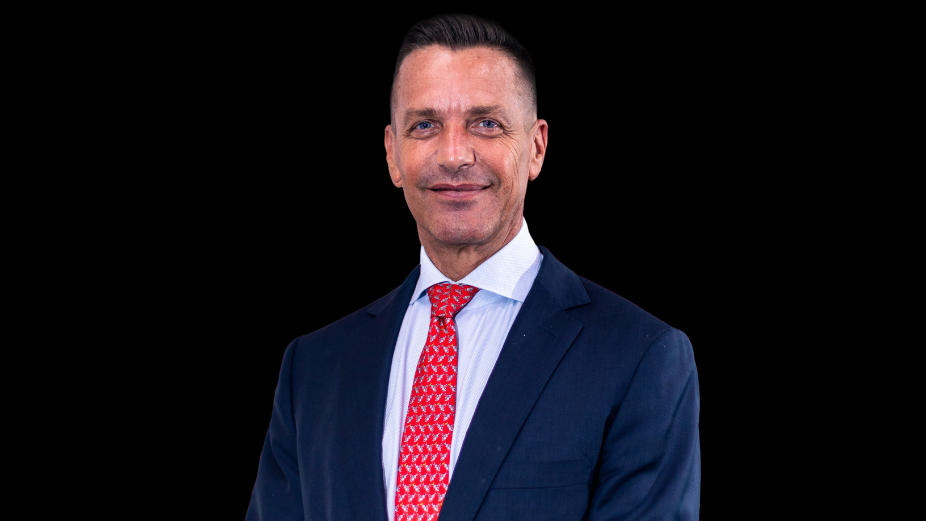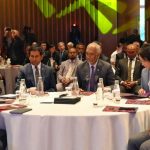In the dynamic financial landscape of the Maldives, Bank of Maldives (BML) shines under the stewardship of Karl Stumke, its CEO & Managing Director. His visionary leadership has been instrumental in reinforcing BML’s status as the leading financial institution in the archipelago. With a keen focus on international best practices and customer-oriented service, Karl has guided BML through transformative growth, ensuring its relevance and prominence in the Maldivian banking sector.
Karl Stumke’s tenure at BML is marked by a deep commitment to the community and a strategic approach towards inclusive banking. Under his leadership, the bank has extended its reach, touching the lives of nearly every citizen and business in the Maldives. This extensive network is a testament to Karl’s philosophy of being more than a financial institution; it’s about being a partner in success for individuals, families, and businesses. His dedication to creating long-term value for shareholders, coupled with a firm commitment to community development, encapsulates the essence of BML’s mission under his direction.
1. What drew you to the Bank of Maldives, and how did your journey lead you there?
My first visit to the Maldives was in December 1997, where I experienced the pristine beauty of the islands. Over the years, I returned regularly with my family. Upon retirement at 55, I reflected on my career, which predominantly involved revitalising underperforming businesses for large institutions. This often required a rigorous cost-cutting process, personnel restructuring, and strategic realignment.
As I approached the end of my career, I wanted to run a business that didn’t require fixing. The prospect of running a stable, profitable bank appealed to me as a new challenge. The Bank of Maldives presented itself as an excellent opportunity—it was already a strong and dominant player in the market with a solid brand and efficient systems.
My aspiration was to test my abilities in enhancing an already well-functioning bank. The vision was to leave a lasting legacy of improvement, ensuring that when I eventually step down, the bank would be in an even better position for my successor to continue the journey.
2. How has your experience in leading international businesses influenced your approach towards managing BML, given its unique geographical location?
My experience in leading international businesses has significantly shaped my approach to managing the Bank of Maldives (BML), considering its unique geographical location. The distinction between leadership and management is crucial to this discussion. In my view, leadership revolves around inspiring people, while management focuses on supervision.
In the international context, leadership is paramount, a principle I aim to instil at BML. The mindset shift from management to proactive leadership is essential for making a substantial impact on the organisation. This shift becomes particularly challenging in BML’s established legacy, where the emphasis has traditionally been on management rather than leadership.
One aspect is the need to challenge the conventional command and control approach. Managers should evolve into leaders, delegating authority and fostering a culture of individual responsibility. This shift is vital for breaking away from the longstanding 40-year legacy and introducing a more dynamic and forward-thinking ethos.
As an expatriate CEO, my international experience affords a unique perspective. I bring an impartial stance to decision-making, free from political affiliations or family associations. This freedom allows me to prioritise the bank’s and its stakeholders’ best interests. Being an expatriate further facilitates this independence.
Drawing from my 38 years of international experience, I aim to introduce innovative practices to BML. For instance, my previous organisation successfully implemented a paperless system, significantly enhancing efficiency and aligning with sustainability goals. During my tenure, I aspire to lead BML towards becoming a paperless organisation, emphasising efficiency and environmental responsibility.
In the Maldives’ small and close-knit community context, the challenge of managing people, especially friends, becomes apparent. The interpersonal dynamics within small islands make performance management a delicate task. Branch managers, for example, may have personal connections with everyone on the island, from football friends to fishing buddies and family members. Expecting them to deliver tough messages becomes a complex and conflicted responsibility, reflecting the unique challenges of leadership in a tightly interconnected community.
3. How do you handle the responsibility and pressure that comes with leading the nation’s primary bank?
Handling the responsibility and pressure of leading the nation’s primary bank is a unique challenge beyond the typical role of managing a financial institution. Unlike my previous experiences running large banks in sizable countries where the banks were systemically important, the Bank of Maldives carries a greater weight.
The distinction lies in the fact that any misstep doesn’t just affect the bank; it directly affects the entire economy. If the bank encounters issues, such as a three-day closure due to system failures, the entire country feels the impact. The responsibility is immense because the bank’s smooth operation is integral to the functioning of the national economy.
The extra burden of getting things right is not solely a personal concern. It extends to the expectations of the entire nation. The consequences of any failure or disruption in operations have far-reaching effects.
Furthermore, being a Maldivian bank adds another layer of responsibility. Some decisions must be made not purely based on economic rationale but with a societal responsibility in mind. Not every action can be solely profit-driven. There are instances where the bank must prioritise actions that benefit society, even if they don’t maximise economic gains. An example is our decision to reduce student loan rates, a move that, while costing the bank money, we want to make education more affordable for the upcoming generation.
I benefited from a good quality education because of low-interest rates, and we need to do the same thing as a bank.
4. Are there any international banking practices or trends you believe BML could benefit from adopting?
In my January speech, I highlighted a global trend: the decreasing emphasis on physical branches in the banking sector. This shift is evident as banks worldwide continue to close branches due to the increasing adoption of digital services.
This transformation is not unique to the global landscape; it’s happening in the Maldives as well. Since the onset of COVID-19, there has been a notable surge in digital adoption, particularly among the younger generation. However, culturally, we in the Maldives value the presence of physical branches. They contribute to our brand visibility and engender trust among the public. It’s a tangible representation of our existence, not just a virtual entity in the cloud.
While acknowledging the global trajectory towards digital interactions, we in the Maldives anticipate the continued importance of physical branches. It’s not an “either-or” scenario but a synergistic blend of both brick-and-mortar and digital platforms. Over the next decade, we foresee a reduction in the number of branches, but they will persist alongside a growing digital presence.
Unlike the UK and other countries, the Maldives has a unique opportunity to consider going cashless. Being an island community, we could explore the prospect of becoming a cashless society in the future. This transition, however, needs to be mindful of the significant older generation still relying on traditional forms of payment.
Another area of interest is the integration of Artificial Intelligence (AI). Embracing AI can significantly enhance operational efficiency by automating mundane tasks, allowing human resources to focus on more creative and complex aspects. In the coming year, I aim to see BML leverage AI, particularly in areas such as compliance and Anti-Money Laundering (AML) issues. This involves experimenting with AI applications, including potential collaboration with platforms to explore their effectiveness in enhancing various aspects of banking operations.
5. What is your attitude towards innovation?
I’m a strong advocate for innovation, recognising that companies must continually evolve. The only constant is change, and this was a challenge I faced at BML. I aim to instil an innovative culture within the organisation, where each individual is tasked with achieving two innovative feats or implementing two process changes despite the initial resistance from employees.
Despite the initial shock, the expectation is for everyone to adapt to this changing culture. Over time, people become accustomed to it, and in three years, it becomes second nature. Our goal is to seek ways to enhance our processes continually. While I can only personally oversee some things in the bank, I have 2,000 pairs of eyes observing daily operations and identifying areas for improvement.
We need these 2,000 eyes and hands to actively contribute to fixing identified issues to expedite the process. Relying solely on a few experienced individuals would be a slow endeavour. We’re making gradual progress, and it will gain momentum over time. I firmly believe in the power of innovation. The subsequent step involves teams becoming comfortable with change, leading to more challenges across divisional teams.
However, certain practices within the bank are detrimental to customer service, and we must address these shortcomings for improvement.
6. How does BML plan to attract and retain the younger generation as employees and customers?
In the Maldives, given its small size, individuals often find it difficult to secure employment in their desired fields, even after pursuing relevant education at university. The mismatch between career aspirations and available job opportunities is a prevalent issue.
Being one of the largest employers in the economy, our organisation inevitably becomes a destination for many job seekers. Unfortunately, this sometimes leads to individuals being in roles they are not passionate about. This situation is disheartening for two reasons: firstly, it results in people working with us who would prefer not to, and secondly, it often leads to disengagement and short tenures.
It’s difficult to attract individuals who aspire to be bankers. In today’s job market, especially with the dynamics of Generation Z and Generation X, employees tend to stay with an organisation for a relatively short period, typically not exceeding four years. The traditional employment history of 40, 15, or 10 years is no longer the norm.
As employers, we need to adapt to this changing landscape and communicate to the youth that our organisation offers a valuable career progression and serves as a training ground. It’s crucial to acknowledge the reality of higher turnover rates and not perceive it as a negative aspect. In fact, it can be beneficial for both individuals and the organisation.
Embracing a more dynamic workforce means letting go of the expectation of jobs for life. Instead, we should view ourselves as a training ground, encouraging talented individuals to stay while understanding and supporting those who choose to explore opportunities in different fields. We encourage the good ones to stay and understand those who need to move on to other backgrounds.
7. How does BML intend to leverage the tourism industry, given its significance in the Maldivian economy?
Firstly, as the largest bank in the Maldives, BML naturally becomes a focal point for businesses in the tourism sector. Due to our substantial balance sheet, we can cater to the financial needs of these businesses more effectively than smaller banks. This positions BML as a primary choice for those in the tourism industry seeking substantial financial support.
However, the more compelling aspect lies in exploring how the Maldivian economy can diversify away from an overreliance on tourism. While tourism is a vibrant sector, there is a need to identify and nurture alternative industries. Beyond the well-established tourism and fishing sectors, there’s an opportunity to explore industries like agriculture, transshipments, light manufacturing, and other sectors that can contribute to economic resilience.
In addition to supporting existing ventures, BML aims to introduce innovative financial solutions within the tourism industry. This includes tailoring repayment schedules to mirror seasonal variations. By aligning repayments with the high and low seasons of tourism, businesses can better manage their cash flows.
Furthermore, BML is considering more creative financial instruments within the tourism sector. This may involve exploring equity financing options for resorts potentially acquiring a stake in these businesses. Leasing arrangements and even resort ownership with subleasing strategies are also being considered. These initiatives are part of a broader effort to adapt financial structures to the unique characteristics of the tourism industry.
BML envisions launching new initiatives in the coming year to support these strategies. The overarching goal is not only to cater to the current needs of the tourism industry but also to facilitate economic diversification by encouraging the development of alternative industries in the Maldives.
8. What’s next for BML?
The decision on the future direction of BML lies with the board, and recent strategy sessions, including the upcoming one on the 27th of this month, are pivotal in shaping that direction. The fundamental question is whether BML maintains its status as the dominant bank in the Maldives. This decision would tie the bank’s success to the fluctuations of the local economy, with good years yielding better results and bad years presenting greater challenges.
Another option under consideration is a strategic shift towards expansion, involving potential local acquisitions or even venturing beyond the borders of the Maldives. However, this expansion comes with its risks and challenges, including the need to define a unique selling point and assess what BML can offer that surpasses the capabilities of other countries. The financial implications and potential impacts on the bank’s core operations are also significant.
The timeline set in January, indicating the possibility of some form of international presence outside of the Maldives within 18 months, is approaching. While acknowledging the leeway, there is an anticipation that a decision will be reached by January, with the board set to deliberate on this matter in the next two weeks.
Importantly, the discourse emphasises that there’s merit in being a Maldivian bank, provided BML excels in its role and strives to be the best. The aspiration is for customers to choose BML not out of obligation but because they genuinely want to bank with the institution. This shift in perspective is crucial to achieving success and underscores the commitment to excellence in the core role of a Maldivian bank.













